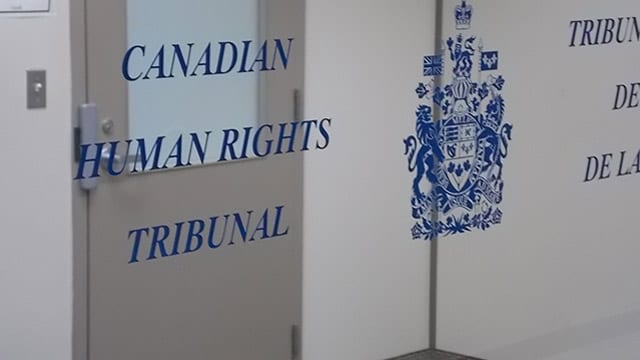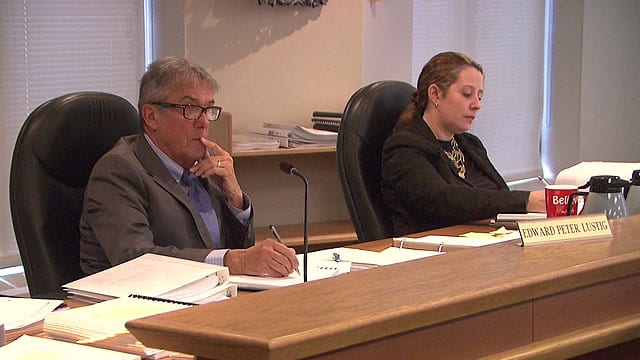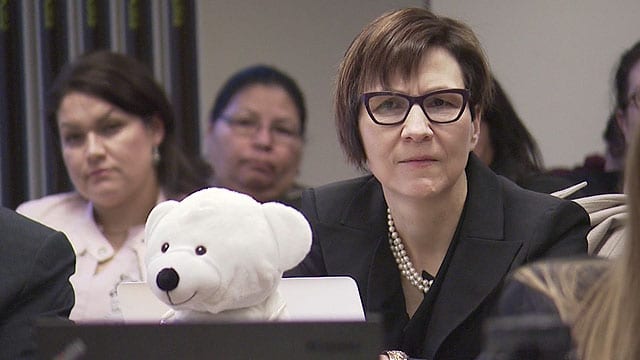

Mark Blackburn
APTN News
The Canadian Human Rights Tribunal has extended a deadline for parties involved in a First Nations child welfare case to come up with a plan to disperse what will be billions of dollars in compensation because it says it felt forced to do so by Canada.
The tribunal issued a letter to the parties involved in the case Wednesday in response to a request from the Attorney General of Canada (AGC) to have a Dec. 10 deadline moved back in order to “assist” the court.
“The panel is perplexed by such a request made by a party appearing in front of the Federal Court,” the letter from the tribunal said. “The tribunal has no say in the Federal Court’s case management and decision-making. It certainly has respect for the Court and understands the importance of having sufficient time to make the best-informed decision in such an important case. With the December 10, 2019 date rapidly approaching and the current state of things, the panel believes that not much collaboration has been accomplished.
“The panel feels “cornered” and does not appreciate it.”
The panel in the letter is made up of two lawyers, Edward Lustwig and Sophie Marchildon, who are overseeing the case at the tribunal.
The government sent the request to them on the same day it was in federal court asking a judge to pause its compensation ruling.
The compensation is in relation to a ruling issued by the tribunal on Sept. 6 which awarded $20,000 to each on-reserve First Nations child who was apprehended for reasons other than sexual, emotional or physical abuse. The tribunal also awarded another $20,000 on top of that because it found the government’s discriminatory policies towards First Nations children on reserve to be “wilfull” and “reckless.”
The $40,000 in total is also being extended to the children’s parents or guardians.
In a landmark ruling released on Jan. 26, 2016, the tribunal ruled that Canada discriminated against First Nations children on reserve for not properly funding the agencies charged with helping them.
The tribunal originally gave the parties until Dec. 10 to work out a plan on how to contact those who are eligible and how the compensation should be paid.
According to an affidavit filed by a government bureaucrat, the cost could total $8 billion.
Canada balked at the compensation ruling saying that the tribunal extended its powers and instead of sitting down with the parties involved with the case to work out a plan, it turned to the Federal Court and asked that the ruling be paused until it’s judicially reviewed.
That hearing to have the ruling paused went before Justice Paul Favel on Nov. 25 – the same day the government wrote to the tribunal asking for an extension – and the same day Canada announced that it would consent to a $6 billion class action against the government dealing with the same issues.
“The panel is disappointed that the AGC did not come back to the panel asking for an extension of the December 10, 2019 dates in September or October even if it was seeking judicial review of the merits of the ruling,” the letter said.
“The AGC knows that the panel is flexible and has already accepted to modify deadlines in the past.”
Read More:
Federal government challenging tribunal order to compensate First Nations children in care
Canada is ‘shopping courts’ through appeal of Indigenous child welfare ruling: Blackstock
Cindy Blackstock, along with the Assembly of First Nations (AFN), is the lead plaintiff in the case against Canada.
“I feel as frustrated as the tribunal,” says the executive director of the First Nations Child and Family Caring Society.
Blackstock says the tribunal opened the door to the government’s concerns in its Sept. 6 compensation ruling.
“If anyone has any questions or concerns they could reach out to the panel and deal with it,” Blackstock says of the ruling. “So that was Canada’s opportunity to say if they wanted an extension – instead they sat on it until the eleventh-hour after they filed their federal court judicial review and then sent this letter in.
“It’s very disrespectful of the process.”
According to Blackstock, the caring society has been working with the AFN to work through a process to create a method of contacting those who are eligible under the compensation order and how the money will be dispersed.
Blackstock says the plan can’t be disclosed until it’s been filed with the tribunal.
(Cindy Blackstock, with Spirit Bear, at the Canadian Human Rights Tribunal hearings in Ottawa. Blackstock, along with the AFN, is leading the fight with Canada. APTN file)
In the meantime, the tribunal acknowledged the work some of the party members have been doing.
“The panel understands that the other parties have made significant efforts to comply with the tribunal’s deadline and appreciates it greatly,” said the tribunal’s letter.
“However, the panel wishes that Canada provide input on that work as per the order.”
Julian Falconer is the lawyer for the Nishnawbe Aski Nation (NAN), an organization that represents 49 First Nations in northern Ontario and is involved with the case.
NAN is singled out in the tribunal’s letter debunking the government’s suggestion that Justice Favel would need more time than the Dec. 10 deadline would provide to rule on the stay application.
“The court never expressed concern around the tribunal’s timeline and indeed at the end of the case, on day two, November 26, Justice Favel advised in clear terms that he would do everything humanly possibly to get this out quickly.
“I think the problem here is the failure of Canada to do nothing for such a long period of time.”
The deadline extension will ultimately delay any compensation that First Nations children apprehended by the child welfare system will receive.
APTN News contacted Marc Miller, the Indigenous services minister for a comment.
“We’re seeking a solution that will provide comprehensive, fair and equitable compensation for First Nations children in care,” wrote spokesperson Kevin Deagle in an email.
“This means engaging in constructive conversations with partners about how to better compensate all affected children. More time to work with our partners will inform a better way forward.”
This will be good news to the tribunal which ends its letter with an offer to parties to bring concerns to it.
“The panel reiterates that all parties may address the tribunal if the deadlines set by the panel are difficult to meet,” the letter said.
But then it adds a warning.
“This being said, no party can unilaterally elect to simply not-comply with tribunal orders.”
@mblackburn21
Correction: The story originally said the government was trying to strike down the tribunal’s ruling. It asked the Federal Court to pause the ruling until the judicial review is heard.











